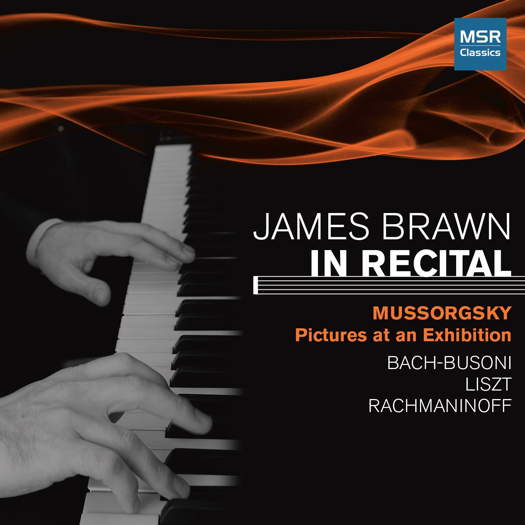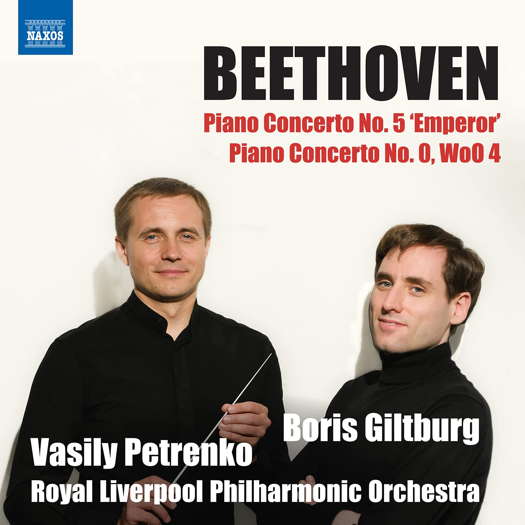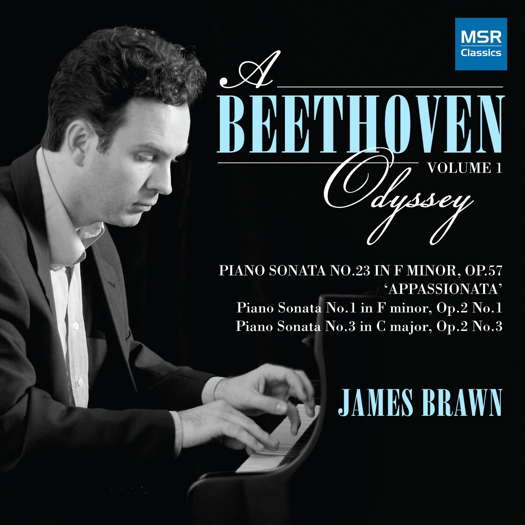 SPONSORED: CD Spotlight. True Command - James Brawn plays Bach, Liszt, Musorgsky and Rachmaninov - recommended by Andrew Schartmann.
SPONSORED: CD Spotlight. True Command - James Brawn plays Bach, Liszt, Musorgsky and Rachmaninov - recommended by Andrew Schartmann.
All sponsored features >>

Masterly Playing
Boris Giltburg plays two very different Beethoven piano concertos, strongly recommended by GERALD FENECH
'... brilliantly supported by Vasily Petrenko and his Royal Liverpool Philharmonic Orchestra ...'
So little connects the two concertos on this album, besides their common key of E Flat, that it seems almost unlikely that both were composed by the same person, albeit at two different stages in life: Beethoven aged thirteen and thirty-eight. On the one hand, we have one of the most famous concertos ever written, the 'Emperor' Concerto with its radiant and glowing melodies, showing Beethoven at the peak of his powers. On the other there is the Piano Concerto No 0, WoO 4, one of the earliest works and among the least known, a composition of immense craftsmanship and self-assured bravura, although one that perhaps does not yet foreshadow Beethoven's true genius.
Listen — Beethoven: Allegro moderato (Piano Concerto No 0)
(8.574153 track 4, 0:00-0:46) ℗ 2022 Naxos Rights (Europe) Ltd :
It would be superfluous to judge the No 0 with the composer's mature works: instead it should be valued for its own worth. By 1784, the year Beethoven wrote the piece, Mozart's influence on the concerto genre was yet to be felt, thus Beethoven's early concerto is more likely to have been modelled on the popular concertos of J C Bach – brilliant and pleasing, largely keyboard centred, with modest orchestral forces providing simple accompaniment rather than having equal prominence with the soloist. Beethoven's piece is full of piano writing that brims with intricate and fiery passagework that, at times, verges on the overly complex. It is a work to impress and show off with, and in all likelihood Beethoven composed the concerto to perform himself at the electoral court in his native Bonn, where he was employed at the time.
In addition to the written piano part, multiple cadenzas and connecting passages are implied in the score. These the composer would have improvised at each performance to further enhance the brilliant effect. The concerto's duration is only slightly longer than the first movement of the 'Emperor', but with an animated opening 'Allegro', a captivating 'Larghetto' full of lyrical beauty that goes beyond being simply elegant or charming, and a 'Rondo-Allegro ma non troppo' that has an abundance of sparkling, light-fingered virtuosity within a framework of humour and sunshine, it is a work that certainly deserves more exposure.
Listen — Beethoven: Rondo: Allegro, ma non troppo (Piano Concerto No 0)
(8.574153 track 6, 0:00-0:58) ℗ 2022 Naxos Rights (Europe) Ltd :
A note on the performance: the orchestral score of the concerto has been lost and the only extant score is the piano part written out in Beethoven's hand, which includes the tutti sections reduced for piano. As an alternative to reconstructing the lost orchestration, Boris Giltburg has recorded the work as a concerto without orchestra, limiting his arrangement to the remaining original material.
Listen — Beethoven: Larghetto (Piano Concerto No 0)
(8.574153 track 5, 6:36-7:33) ℗ 2022 Naxos Rights (Europe) Ltd :
If the early concerto requires us to assess our expectations of how a Beethoven work should sound, no such mental shifts are necessary with his last and best known Piano Concerto No 5, Emperor. In a way, the common key between the two works only serves to intensify the contrast between them when they are heard consecutively. The basic harmonic landscape is the same, which makes the huge leap between the two in terms of their sound worlds and expressive power all the more amazing.
Listen — Beethoven: Adagio un poco moto (Piano Concerto No 5)
(8.574153 track 2, 5:53-6:43) ℗ 2022 Naxos Rights (Europe) Ltd :
In terms of its harmonic landscape, it is remarkable how much of the Emperor Concerto's material is based on very simple harmonic progressions. This harmonic simplicity lends a wonderful sense of stability to the work, which Beethoven happily builds upon. Much of the piano writing is in the highest reaches of the keyboard, and this contrast between harmonic rootedness and the soloist's sojourns into the stratospheric heights is something Beethoven explored throughout his late period from the Hammerklavier Sonata to the last movement of his Sonata No 32, Op 111.
Beethoven's life was full of highs and lows around the time he was writing the Emperor Concerto in the spring of 1809. His financial stability was assured after receiving an annual salary from three patrons on condition that he remains in Vienna. But on 9 April things changed when Austria declared war on Napoleon. A month later the French besieged the city, and the composer had to hide in the basement of his brother Caspar's house, wrapping his head with pillows to protect the last vestiges of his hearing from the continuous noise of the bombardment. It is a miracle that Beethoven was able to create such a glorious work amidst all that was going on around him.
By the time the Emperor premiered in Leipzig in November 1811, Beethoven's hearing had deteriorated to the point where he was unable to play the piano part himself. He therefore took special care to annotate the score in detail, culminating in the so-called 'cadenza prohibition'. The performance took the audience by storm, and so it remains to this day. Indeed, it is one of Beethoven's numerous works to successfully combine supreme artistic achievement with immense popularity.
Finally, a note on the concerto's nickname: although the majestic character of the music is evident, the nickname Emperor did not originate with Beethoven; and since no definitive source has been discovered despite many apocryphal stories that still persist, the nickname, which is only used in English-speaking countries, has traditionally been coined by the many listeners who down the years found the concerto to be the real 'Emperor' among the genre.
Listen — Beethoven: Rondo: Allegro (Piano Concerto No 5)
(8.574153 track 3, 9:03-10:02) ℗ 2022 Naxos Rights (Europe) Ltd :
Boris Giltburg, who also contributed the enlightening booklet essay, performs these works with amazing bravura, and his masterly playing should engross the listener to the full. Awesome music-making, brilliantly supported by Vasily Petrenko and his Royal Liverpool Philharmonic Orchestra who consistently play out of their skin in the Emperor. I strongly recommend this issue, if only to give yourself a chance to peep into Beethoven's teenage piece. Sound and presentation are first-rate.
Copyright © 28 April 2022
Gerald Fenech,
Gzira, Malta

CD INFORMATION - BEETHOVEN: BORIS GILTBURG
ROYAL LIVERPOOL PHILHARMONIC ORCHESTRA



